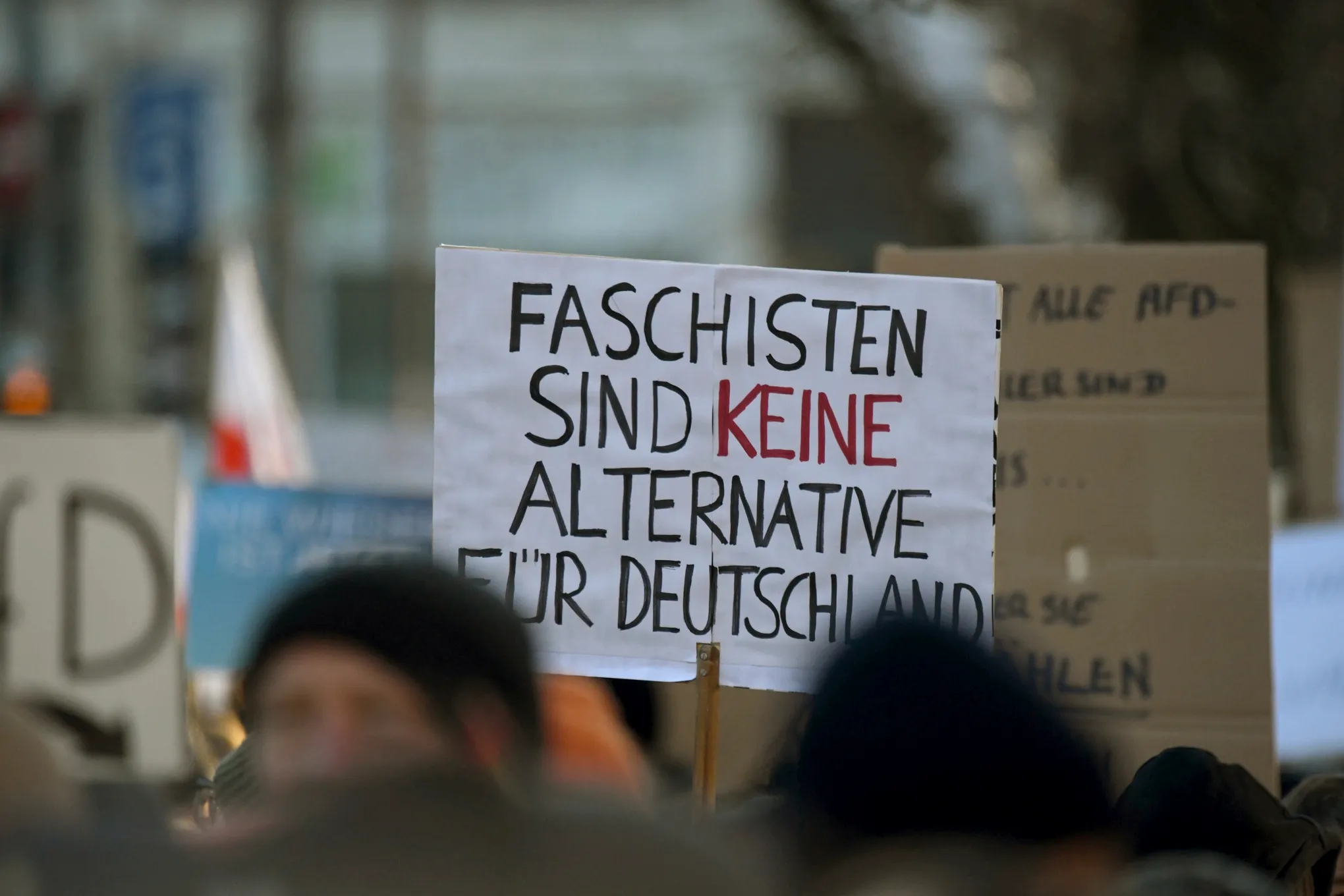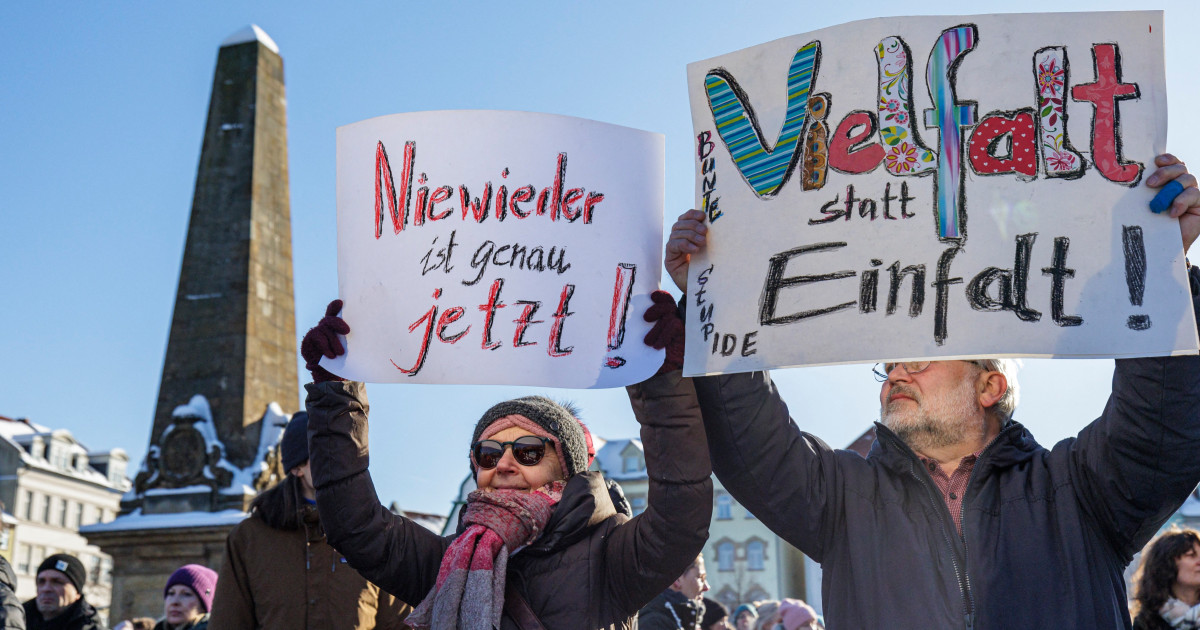On Saturday, tens of thousands of people took to the streets in cities across Germany to protest against the far right. Attendees at these events held banners with slogans like “Never Again is Now,” “Against Hate,” and “Defend Democracy.” These sizable crowds were part of a series of demonstrations that have been gaining momentum in recent days.
The protests were triggered by a report revealing that right-wing extremists had recently convened to discuss the mass deportation of millions of immigrants, including those with German citizenship. Members of the far-right Alternative for Germany party (AfD) were reportedly present at this meeting.
Police reported that a protest in Frankfurt on Saturday afternoon drew a massive crowd of 35,000 people. Similar demonstrations in cities such as Stuttgart, Nuremberg, and Hannover also saw substantial turnouts.
A comparable protest in Hamburg on Friday, Germany’s second-largest city, drew around 50,000 people, leading to safety concerns and an early end to the event.

Momentum Surges in Protests Against Germany’s Far Right Following Disclosure of Extremist Meeting (Credits: The Seattle Times)
Additional protests are planned for Sunday in major German cities like Berlin, Munich, and Cologne, with expectations of drawing tens of thousands of participants.
While Germany has witnessed protests against the far right in the past, the size and scope of the demonstrations this weekend, not only in major cities but also in numerous smaller cities across the country, are noteworthy.
The significant turnout on Saturday suggests that the protests are mobilizing widespread opposition to the AfD in a new and impactful way. Initially, small gatherings have evolved into protests that, in many instances, have exceeded organizers’ expectations in terms of participant numbers.
The catalyst for these protests was a report by the media outlet Correctiv last week, revealing an alleged far-right meeting in November attended by figures from the extremist Identitarian Movement and the AfD.
The report highlighted the presentation of a “remigration” vision for deportations by a prominent member of the Identitarian Movement, Austrian citizen Martin Sellner.
The AfD has attempted to distance itself from the extremist meeting, asserting no organizational or financial links, disavowing responsibility for the discussions, and stating that attending members did so in a purely personal capacity.
Despite this, one of the AfD’s co-leaders, Alice Weidel, has severed ties with an adviser who attended the meeting while also criticizing the reporting itself.
The protests also build on growing concerns over the past year about the AfD’s increasing support among the German electorate.
Founded as a eurosceptic party in 2013, the AfD entered the German Bundestag in 2017. Current polling places it in second place nationally with around 23%, well above the 10.3% it won in the last federal election in 2021.
Last summer, AfD candidates achieved victories in the party’s first-ever mayoral election and district council election, marking the first time a far-right party had done so since the Nazi era. The party also made significant gains in state elections in Bavaria and Hesse.
The AfD leads in several states in eastern Germany, where its support is strongest, including three states—Brandenburg, Saxony, and Thuringia—scheduled to hold elections this fall.
As a result, Germany is grappling with how to best respond to the party’s rising popularity.
The widespread anger over the Correctiv report has reignited calls for Germany to consider a ban on the AfD. The Brandenburg chapter of Germany’s Greens voted in favor of pursuing a potential ban at a party convention on Saturday to prevent the rise of “a new fascist government in Germany.”
However, many opponents of the AfD have spoken out against the idea, citing a lengthy process, uncertain success, and the potential benefit of portraying the party as a victim.
Elected officials from various political backgrounds, including Chancellor Olaf Scholz, expressed their support for the protests.
“From Cologne to Dresden, from Tuebingen to Kiel, hundreds of thousands are taking to the streets in Germany in the coming days,” said Scholz in his weekly video statement, emphasizing the importance of the protesters’ efforts “for our democracy and against right-wing extremism.”
Friedrich Merz, head of the center-right Christian Democrats, noted that the protests indicate Germans are “against every form of hate, against incitement and against forgetting history.” He added that the silent majority is asserting its desire to live in a country that is cosmopolitan and free.
Support for the protests extends beyond the political sphere, with prominent figures in sports, entertainment, and business also expressing their attention and backing.
Bayern Munich soccer coach Thomas Tuchel, for instance, spoke out against right-wing extremism at a Saturday news conference, stating, “There is no doubt about it. We stand up 1000% against any kind of extremism.” Tuchel emphasized the importance of sending such a message, stating that there can “never be too many voices” for it.























